
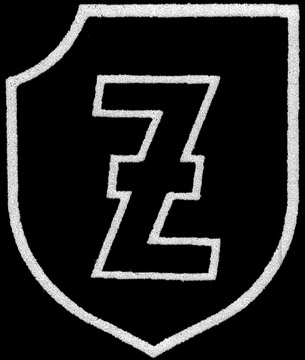
Interview with Günther Ortmann, Honor Roll Clasp winner and Battalion Commander of the SS-Police Division (III./SS-Pol.Inf.Rgt.3), Regensburg, 1989.


Interview with Günther Ortmann, Honor Roll Clasp winner and Battalion Commander of the SS-Police Division (III./SS-Pol.Inf.Rgt.3), Regensburg, 1989.
I am glad you agreed to meet me, as we discussed I would like to write some things down. Can I start by asking what brought you to the Police Division of the SS?
Günther: Yes, you have good company that is trusted. I was not a volunteer for the SS to be clear; I was a police officer under SS leadership. As with all of us, we were order police in the Reich, and when war started the call for war volunteers went out. I and many comrades wanted to do our part and so we went to join the front. We were at first only a police regiment, with police ranks and insignia, not SS. We were under the overall leadership of Reichsführer-SS Himmler; he oversaw both the SS and the Police. Our training was done in Waffen-SS barracks with mostly Waffen-SS instructors, and they were hard on us.
I will say most German police had to stay very fit, but some older ones did not; they were not allowed to volunteer for combat. Only the best and most fit were taken with single men getting the nod first. The thought was married men would think about wives too much. Those of us chosen for duty reported early in the morning and then we marched to the train which took us to our training barracks. For me it was a new adventure that would be a witness to history. We had to attend the full training course for the SS, however some of us already had instructions in marching and so on, so it was easy for us.
You were sent to fight on the Eastern Front, what was that like for you?
Günther: You must understand Russia was vast, a country many times the size of Germany. Russia was very beautiful, with endless scenery and much wildlife. My division was assigned to Army Group North, and we were engaged all the time trying to reach Leningrad and beyond. From the first day, the Russians put up a staunch resistance, which made the going slow and we had to stop often for supplies. The land in the north was harder to move through as it was damp, swampy, and had only lanes for roads. Many divisions were bottled up for days trying to advance; it was the perfect defense for the enemy.
During this time, we were only supposed to be used as reserves, to fill gaps in the line. The enemy resistance in some cases made us front line troops more than once. The closer to Leningrad we moved, the more fortifications we faced. In and around Luga they made fierce stands which took days to break. We pushed the Soviets back and surrounded Leningrad, which proved a tough nut to crack. The high command sent some of the divisions down to the south, so it weakened our hold on the city, the siege went on until 1944.
I remember the winter offensive when the armies from the east came west and tore into our thin lines. We had units pushed back quite far, and Cholm and Demjansk were surrounded, but entered German lore for holding out against all odds. The fighting was very fierce and often hand to hand when we faced massed attacks with hundreds of infantry. The Soviets used first war tactics sometimes, wave after wave that was hard to beat back. They always seemed to have an inexhaustible amount of artillery and ammunition. We did not, even though we had very good weapons, it was a herculean task to keep supplies stocked in this terrain. We also had issues getting our winter clothing brought up when it became cold. We had small, poorly built roads over which all supplies had to come. You have seen the photos of the mud; it was a miracle we received supplies at all.
Sometimes the Luftwaffe had to be used for the front line units, who desperately needed fuel and ammunition. That winter was the coldest on record, and it made movement difficult, but the Soviets moved in troops who were used to the cold. Surprisingly we held that winter in a super-human effort, we stopped their advance and that spring, regrouped and pushed them back. My division stayed in the east until 1943, then we were sent west to regroup and rebuild into a full Panzergrenadier division. Once this happened and we were able to enjoy leave and relaxation, we went to Greece to fight partisans who were organized by the Soviets and the Allies.
They were quite brutal and forced brutal reprisals against them by German units and our Greek allies. Partisan warfare is very bloody, and that is why it was encouraged by the Allies, they used the reprisals as propaganda.

[Above: SS-Polizei-Panzergrenadier-Division near Leningrad posing before a T-26C (Panzerkampfwagen T-26 737r), 1942.]
How did you view the Russians, and how did they view German forces?
Günther: From the very first day we marched into Russia we were welcomed as liberators by the people. I heard in Poland, people threw themselves at the feet of German soldiers, thanking them for freeing them from the Soviets. I did not believe it until I saw it first-hand in the Baltics, and in Russia.
The Soviet system was very cruel to all the people, unless they willingly aided and agreed with them. When were entered Russia the people came out to welcome us, and the first thing they asked for was to have worship services. That was strange to us, as we took it for granted that we could go to a service when we wanted.
I remember St. Nicklaus being reopened and a priest from a Heer unit gave mass to the people. The people said it was the first time since 1922 that a mass was held. The people had little food but were surprisingly self sufficient and lived off the land. They even offered us lunches and dinner parties to celebrate their good fortune. As a Police unit, we were increasingly used for law enforcement during this time. What I mean of this is that, once we secured an area, the people told of people who had ruled over them, most seemed to be Jews. They showed graves of those taken away and killed by the Soviets and demanded justice.
We started to form patrols to go out into the forests to hunt for bands which the people said ran away and hid. We also started to see the first cases of partisan attacks happen. They would cut phone lines, burn bridges, and attack settlements we entered. We were hearing from the elders that during and right after the revolution, countless people disappeared and were never heard from again. This is something we heard in the beginning over and over again. It made our fight very necessary and just, and we had no guilt at all about attacking the Soviets.
It was told to us at the very beginning we must treat the Russian people well they were not our enemies. The system of Bolshevism was what we were fighting to destroy. It was clear to most of us that we prevented the Soviets from attacking us and taking Europe. We ran into army after army that was equipped for an offensive attack, their supplies were massive. To this day I still love the Russian people; they were as much a victim of the Soviets as we were. I hate the Soviet system that killed millions, and wish we would have won, the world would be a much better place.
Speaking of Russia and Greece, can I ask you about the claims of war crimes? I understand the victors say the SS killed many innocent people.
Günther: Not so, it is true we had to deal with some very unpleasant people and situations. I will tell you also that many reporters and authors hunt us down and when we disagree with them, they say, "You do not know history, because these things clearly took place." I reply that, "No, you are saying I do not know your version of history and are upset because I refuse to agree with you".
There are many so-called historians who base their whole arguments about war crimes on what the winners of the war wrote and reported. They use trial excerpts, eyewitness accounts, and confessions of the soldiers who were there. It makes for a nice tidy open and shut case that proves our collective guilt for all time, or so it seems. I was there in many instances of dealing with lawbreakers and partisans. I saw a young man hung because he raped a German Helferin [female assistant]. I saw a village burned because it housed arms and food for partisans, the inhabitants were either shot, if arms were in their homes, or sent to camps for aiding the enemy. I saw what would look like incredible acts of barbarity by our Russian allies, but when the truth came out, they were justified. I saw many acts of revenge by the civilians against partisans, who sometimes lived right in their midst and reported things that got innocent people killed. Regular people hated them as much as we did, they were robbers, hostage takers, killers, and ungodly.
Every German act that appears to show a war crime is, I am confident, a legal reprisal designed to punish the guilty and deter future acts. The police battalions, who operated behind the front, or in occupied areas, faced a well-organized and funded enemy. Something interesting I will say, I attended a course during the war that was done by a Spanish psychiatrist who Franco commissioned to study the minds of the Communists. He deducted that those who favored Communism or the left, were not all there in the head. They were prone to violence, lacked reasoning ability, and were mad at life in general. They hated Christianity, authority, and nature's order of the world. They saw the only way to be happy was to destroy things that stood for what they hated. During the Spanish civil war, they killed clergy, burned churches, destroyed cultural treasures, and re-wrote history to suit their cause.
It was so bad Franco ordered that Madrid be bombed to purge Spain of this disease. After the war, the survivors fled to France, Poland, and of course, Soviet Russia. We had to take up the fight against these people, and they fought with extreme cruelty, and hatred. Our measures had to be equally extreme, as this was the only language they understood, and if they knew their action would condemn their friends and followers, then we had to do this. This was a type of warfare every nation who has ever fought partisans has had to do. The allied nations have a history of this and were just as thorough as we had to be.
Yet in the end they sat as judges against us, knowing full well we did what any nation would have done. I also say that it was not as bad as it is stated by the Soviets and their allies. The partisan war was mostly quiet and involved us just moving into towns suspected of hiding the enemy, searching, and seizing illegal items. The guilty were arrested and sent to jail for a while. The only times force was used was if German units had been attacked and there were losses. We certainly understood it was better to make friends rather than enemies and we worked very hard to build trust and relationships with the civilians. In 1943, we were sent to Greece to rest and refit. The weather was much better than in Russia and the people were very warm and friendly. There had been organized attacks on Greek businesses helping us, so we also had to hunt for the bands doing this. These again were left wing fringe groups, mostly Communists and anarchists, who led the attacks.
They were able to seize control of some territory, where the Greek militia had been repulsed. We led joint attacks on these areas, and it resulted in a large loss of life for the fanatics. The Greeks also executed some when captured, and so did we. It came out that these bands had been guilty of killings, robberies, and hostage taking. Today, all that is told is that we killed many innocent victims, and since the winners say so, it must be true then. That is our fight, which few Germans have the strength to do anymore, so much can be lost if you try to defend our wartime conduct. It is easier to just let the stories be, as we have no way to challenge it. We tried right after the war, and most courts sided with us, and dropped charges, but this new government is persistent, and still goes after Germans today.
I feel as though if there are proven excesses committed by us, then they are canceled out by the incredible cruelty of who we fought. They say we are beasts and animals for being harsh with criminals. Yet they did the same things, they just lie about what caused the reprisal, I am sure people would agree with our response. All the enemy does today is silence us so we cannot defend ourselves. One problem for us is both the Soviets and Allies killed off most anyone who could refute these stories, but before they did, they tricked them into false confessions. I heard this from many LAH [Leibstandarte Adolf Hitler] and Das Reich men; they were in prison with the condemned. They were told of promises of, "If you just admit this you live, if not we go after your family as well".
It is not known that many of the interrogators were former German Jews or communists who fled, only to return and exact revenge. Many of the trials in which guilty verdicts were returned were one-sided trials with false witnesses with political motives. At best they did not understand that they were seeing just punishments for crimes they did not witness.
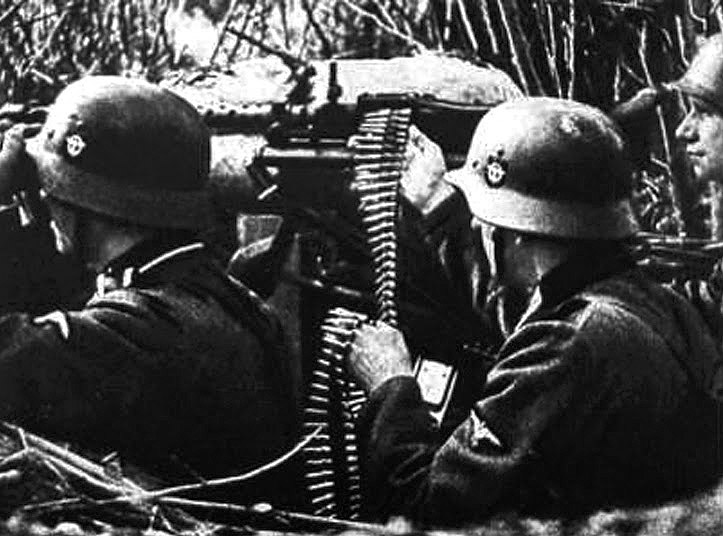
[Above: SS-Police Division. Note the eagle and wreath decals on their helmets.]
[Above: SS-Police patch showing the distinct eagle surrounded by a wreath used for German police.]
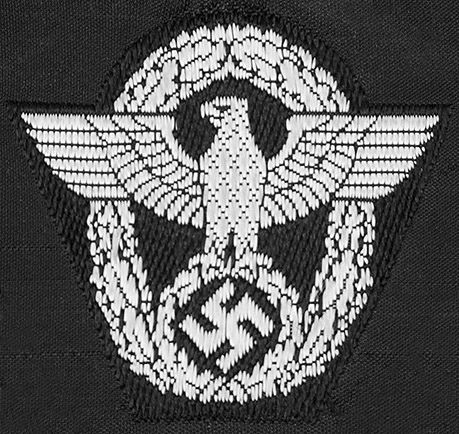
Günther: Look, we were a combat unit that had nothing to do with the concentration camps or Jews. We fought against Jewish partisans, and this led to the evacuation of some of their towns into ghettos. I never saw any mistreatment of Jews, period. I know they were sent to camps, all of Germany knew that, but those who were sent were viewed as enemies. There were countless Jews who remained in Reich territory who left politics alone and in turn were left alone. Berlin had a large Jewish population even at war's end, and Jews fought for the Reich in all capacities as well. They were not our enemy, only the left radicals were. What happened to them in the camps is a matter of debate, which we are not allowed to discuss.
How was your treatment of Russian prisoners of war? It is said they were mistreated and killed.
Günther: I thought we were discussing my wartime service, not war propaganda. However, we took many prisoners, and they were treated well, as far as I could see. Many even came over to our side, especially in the later parts of the war. They did not like how Stalin was waging it, and deep down resented the Soviet system. There were some fanatics and they were kept in many prison camps, and I do not believe they were ever mistreated. I hear stories all the time of them being allowed to work on German farms close by their camps. I know the prisoners we took were well treated and seemed happy to be out of the war. They liked looking at our photos of girlfriends, and home. They were usually very poor and did not have cameras. I felt this was a small treat for them.
Of course, there were some of our men who did not like them at all and made derisive comments about them. They did this because of the way we saw the war being fought by them; the atrocities we saw committed were hard to forget. Our commanders were eagle-eyed when we were rounding up prisoners, strict orders were given to not attack or abuse the prisoners. Also, our men always aided wounded prisoners, even partisans. One of our men was chastised by our doctor for taking too long to bring a wounded female sniper in for treatment. She had shot down a comrade during a counter-attack and was hit by shrapnel from a round of 2cm flak from our flak battalion.
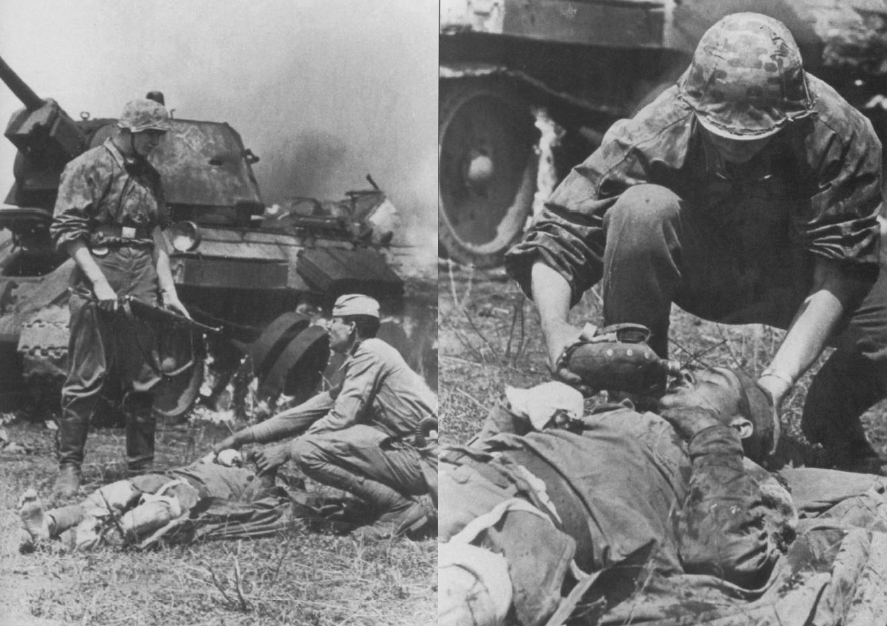
[Above: Chivalry was an SS ideal. Here a Waffen-SS soldier gives water to his wounded enemy, a Russian soldier.]
I understand you won the Iron Cross, and the rare Honor Roll, what was it like to bear these decorations?
Günther: These were given for surviving combat, which is how we view these awards. I am proud to have served my nation in a time of war and fought with honor. The Honor Roll Clasp had nothing to do with that, it was given for again surviving combat and doing enough to earn a second Iron Cross First Class. Soldiers do not fight for awards and decorations, but they are testament to what we went through. The bullets, the shells, the bombs that missed, are what these represent. They also represent the comrades who died for us and at our side. Any honest soldier will tell you he wears his decorations proudly as a reminder of his faithful service to his Fatherland, and to his comrades who made earning these possible. It was a proud moment to be mentioned and awarded the Honor Roll Clasp; I wore it with pride on the ribbon of my Iron Cross.
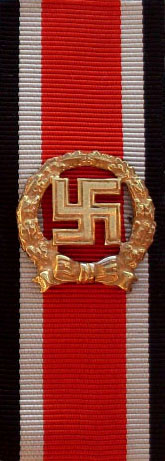
[Above: The esteemed Honor Roll Clasp.]